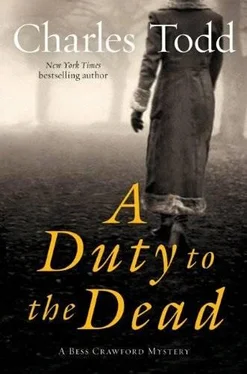I was already learning that the rector, Mr. Craig, had a tendency toward tongue-in-cheek remarks. And so I was prepared to see an additional remark on the first Sunday of her absence, where he wrote, “The service went smoothly and there were several people who spoke kindly about the anthem. If I were a betting man…”
I interpreted that to mean that the people who spoke kindly would also say something to Mrs. Graham on her return.
There were more entries, and then a lapse of a day, and when the writer took up his pen again, it was with shock and disbelief.
The most ghastly thing has happened. Mrs. Graham returned from London, bringing her sons with her, and she asked me if I would keep Peregrine at the Rectory, under lock and key, while she spoke to Inspector Gadd and Lady Parsons. I could see that the entire family was in great distress, and I was grateful when Robert Douglas offered to take the other boys home and see them put to bed. He came back after that was accomplished, expecting to find Mrs. Graham here, but she hadn’t returned. I asked him what in the name of God had brought them back to Kent in such a state, for I had also seen the bloody clothing Peregrine wore, and no one had thought to bring the child a change. Douglas told me that he and Mrs. Graham had returned from a dinner party to find no servants in the house. They went in search of the housemaid and finally came upon her in her own quarters. And Peregrine was there as well, striving to remove a knife from the poor girl’s throat. It was his pocketknife, a handsome large one that had belonged to his father. The girl was quite dead. The only conclusion, considering his condition, was that he must have killed the girl in some fit or other. He’d never been well, but no one had ever expected such a turn of events, and the police asked Peregrine what he was about. He said he wanted his knife back, and that the girl wouldn’t give it to him. After much discussion and consideration, the London police agreed that the boy should be admitted to an asylum as soon as feasible, and that trying him, with his limited range of understanding and emotional response, would be difficult. I have never seen a child so ill and shocked as he was-he hardly knew where he was or why, and though Lady Parsons had questioned him most forcefully, he was in no state to answer her. Inspector Gadd took Peregrine into my study and questioned him privately but had no more success than Lady Parsons. The doctor had come in the meantime, and he was in agreement that this boy was both exhausted and in a state bordering on catatonic. It was nearing morning, and Douglas took Mrs. Graham and the doctor to Barton’s, to speak with the staff there. Before noon, Douglas returned with the doctor, who had prescribed a sedative for Mrs. Graham and left her at her house to rest. The two men then took the dazed lad into the carriage, and I never saw him again.
And then in an addendum dated some weeks later:
On several occasions, I went to the asylum to offer pastoral care to Peregrine Graham, and I was told that the doctors had determined that it was best if he continued the regimen of care they had devised, and that the chaplain at the asylum would see to the lad’s spiritual needs. I have no such faith in Mr. Newcome, and although I spoke to Mrs. Graham about this, she told me that the London police had told her that Peregrine shouldn’t have visitors of any sort. I left it there, though I was very distressed. The other Graham boys have seemed to come through this nightmare with few scars, but Arthur was very subdued when first he came home from London. Some time afterward, he was sent away to school, and I saw him only on holidays.
I thumbed through some twenty ensuing pages, but there was nothing more about Peregrine Graham.
I was disappointed that the rector had only been able to describe events as he was told them by the Grahams, but his remark about Arthur cut me to the quick. Subdued…
Peregrine read the sections again. “I don’t recall much about any of this, I was half sick and too dazed to take in what was happening to me.”
“Had you been sedated-given anything to calm you?”
“I don’t know, I hardly remember my conversations with the police. My stepmother brought me a cup of sweet tea that made me drowsy. Still, I can recall that Inspector Gadd was very kind. He asked me why I had done such a thing, and then again, what Lily had done to me that made me want to harm her. I could only stare at him, but he didn’t shout as the London police did. He put his hand on my knee, and told me not to worry, that I would be all right. But I wasn’t, was I?”
I was nearly sure that Peregrine had been drugged. To keep him quiet on the journey to London, and while he was there, so he wouldn’t trouble anyone. But then why take him? There had been the excuse of seeing a doctor, but nothing had come of it. I was left with the only logical answer. If he was left at home alone with only the servants, someone might have discovered that the public view of Peregrine Graham was not the real truth.
Whatever my feelings about Mrs. Graham, this was a horrible supposition, that she would have treated her stepson so cruelly. But then I remembered something else-something Peregrine had told me.
He had found his stepmother in bed with her cousin Robert Douglas.
I sat back in my chair.
“My good God,” I whispered.
Peregrine looked at me. “What is it?”
“I-it’s nothing. Just-look, I need to be by myself for a while. Do you mind?”
“I’d like to take these to my room and read the passage again. Is that all right?”
“Yes, of course. I’m tired, Peregrine, that’s all.”
I thought he saw through me, but he turned and went to his room, and I sat there staring out the window, not seeing the traffic in and out of the shops, not seeing the sun fade behind gray clouds, looking inward at something rather terrible.
Peregrine believed that Jonathan or Timothy-or both-were the sons of the liaison between Mrs. Graham and her cousin Robert Douglas.
Was Timothy’s clubfoot the mark of that liaison? I had no idea if a clubfoot was a result of inbreeding. But it might be, for all I knew. It might also run in families.
I tried to picture each of the sons in turn. That got me nowhere. I hadn’t been looking for indications of their ancestry when I was speaking to them face-to-face. But even if they weren’t Robert’s offspring, Mrs. Graham might have been so frightened that Peregrine would tell his father what he’d seen, she’d done her best to destroy his credibility. And what better way to do that than by indicating he wasn’t really right in the head? However cruel that was, it would be nothing to what she might have done years later to protect her own child and blame Peregrine for a crime he hadn’t committed.
Everyone agreed she had been terribly distressed by the death of Lily Mercer-and she’d paid the girl’s family handsomely to leave England. Would she have felt so strongly about protecting Peregrine, or gone to such lengths to hide what had been done? She had kept him out of prison, not from kindness but because his brothers would have suffered the shame of being related to a murderer. And I hardly thought Mrs. Graham was the first person to send an unwanted family member to an asylum. Little better than a prison in some ways, it could at least provoke a measure of sympathy for the family of the afflicted.
I thought about the young Prince John who had had seizures, and how he’d been removed from the public eye very quietly, until he’d been nearly forgotten. Mrs. Graham had succeeded in doing much the same with Peregrine.
I was still trying to understand the full impact of my thinking when there was a knock at the door. It was Peregrine, and he held one of the rector’s journals in his hand.
Читать дальше












